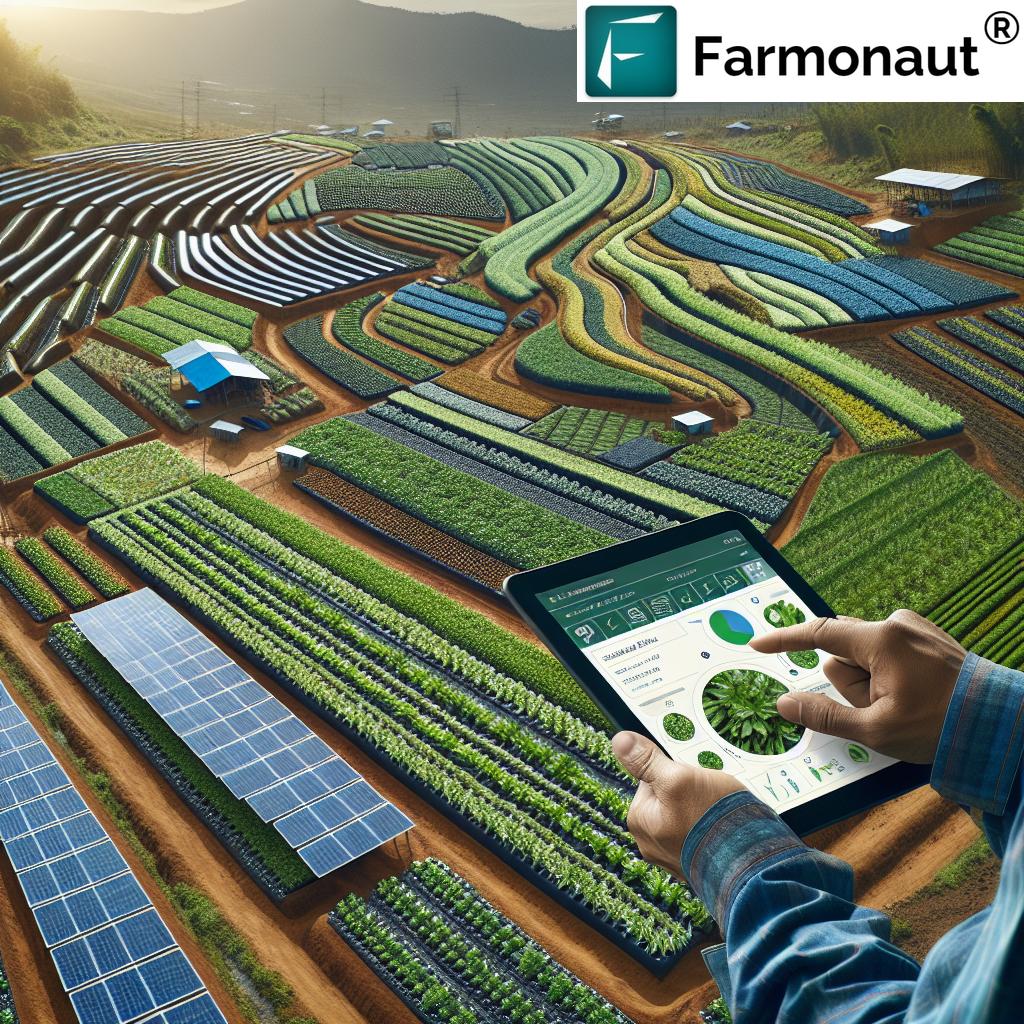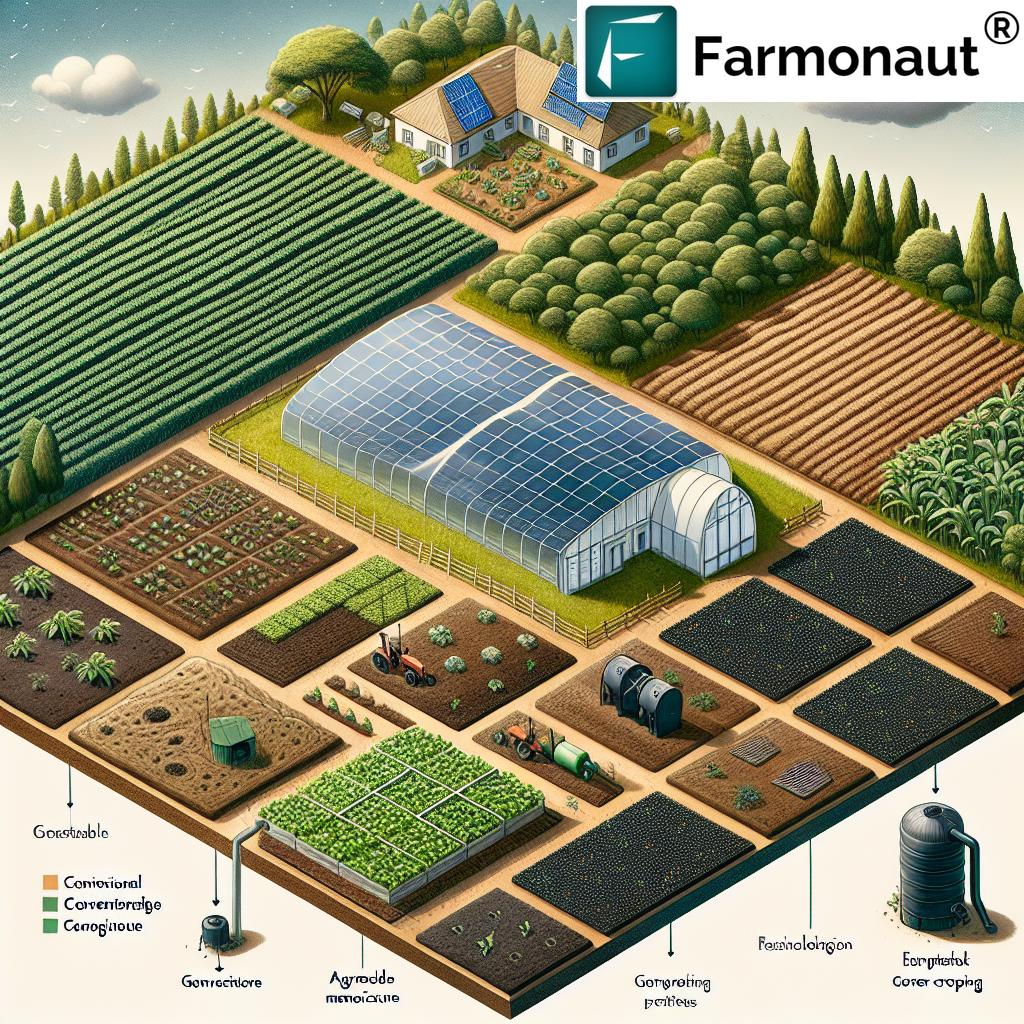Revolutionizing Kenyan Agriculture: Climate-Smart Farming Solutions for Sustainable Food Systems in Nairobi

“Nairobi’s climate-smart farming initiatives aim to reduce agricultural emissions by up to 30% by 2030.”
In the heart of East Africa, Nairobi is emerging as a beacon of hope for sustainable agriculture practices. As we delve into the world of climate-smart farming solutions, we find ourselves at the forefront of a revolutionary change in how we approach food systems in Kenya and beyond. The urgent need to address climate change, biodiversity loss, and food security has never been more apparent, and Nairobi is rising to the challenge with innovative approaches that promise to transform the agricultural landscape.
In this comprehensive exploration, we’ll examine how climate-smart farming techniques are reshaping Kenyan agriculture, with a particular focus on the vibrant agricultural scene in Nairobi. We’ll uncover the latest agritech innovations, discuss the implementation of low-emission agricultural technologies, and highlight the crucial role of ecosystem services in creating resilient and sustainable food systems.
The Global Context: UN Conferences and Their Impact on Kenyan Agriculture
The year 2023 marked a significant turning point in global environmental policy, with a series of pivotal UN conferences addressing the intertwined issues of climate change, biodiversity, and desertification. These conferences have set the stage for transformative action in agriculture, particularly in regions like Nairobi, where the impacts of climate change are acutely felt.
- COP16 on Biodiversity (October 2023)
- COP29 on Climate Change (November 2023)
- COP16 on Desertification (December 2023)
These global gatherings highlighted the urgent need to integrate food systems into broader environmental frameworks. For Nairobi’s agricultural sector, this means adopting practices that not only enhance food production but also contribute to climate mitigation and biodiversity conservation.
Climate-Smart Farming: A Game-Changer for Nairobi’s Agriculture
Climate-smart farming is revolutionizing agriculture in Nairobi by introducing practices that are both productive and environmentally sustainable. These innovative approaches are helping farmers adapt to changing climate patterns while reducing their carbon footprint.
Key aspects of climate-smart farming in Nairobi include:
- Precision agriculture techniques
- Water-efficient irrigation systems
- Crop diversification and rotation
- Soil conservation practices
- Use of climate-resilient crop varieties
By implementing these strategies, Nairobi’s farmers are not only increasing their yields but also contributing to global efforts in combating climate change.
Agritech Innovations Transforming Nairobi’s Farming Landscape
The integration of technology in agriculture is playing a pivotal role in Nairobi’s transition to sustainable farming practices. Agritech innovations are empowering farmers with data-driven insights and tools to optimize their operations.
Some of the cutting-edge agritech solutions being adopted in Nairobi include:
- Satellite-based crop monitoring systems
- AI-powered pest and disease detection
- IoT sensors for soil and climate data collection
- Blockchain technology for supply chain transparency
- Mobile apps for farm management and market access
These technologies are not just improving farm productivity; they’re also making agriculture more attractive to the younger generation, ensuring the sustainability of the sector in Nairobi.

At Farmonaut, we’re proud to be at the forefront of this agritech revolution. Our satellite-based farm management solutions are helping Nairobi’s farmers make informed decisions about their crops, leading to improved yields and reduced environmental impact. Learn more about our innovative solutions:



Low-Emission Agricultural Technologies: The Future of Farming in Nairobi
As Nairobi strives to reduce its agricultural emissions, the adoption of low-emission technologies is becoming increasingly important. These innovations are helping farmers maintain productivity while minimizing their environmental footprint.
Key low-emission technologies being explored in Nairobi include:
- Green ammonia production for fertilizers
- Biogas digesters for energy production
- Electric farm machinery and vehicles
- Precision fertilizer application systems
- Agroforestry and carbon sequestration techniques
“Green ammonia production could potentially decrease nitrogen fertilizer-related emissions in Kenya by 90%.”
The potential of green ammonia in revolutionizing fertilizer production is particularly exciting. By utilizing renewable energy sources, green ammonia could significantly reduce the carbon footprint of Nairobi’s agricultural sector.
Ecosystem Services in Agriculture: Nurturing Nairobi’s Natural Capital
Recognizing the value of ecosystem services is crucial for sustainable agriculture in Nairobi. By preserving and enhancing natural ecosystems, farmers can benefit from improved soil health, water retention, and natural pest control.
Key ecosystem services being promoted in Nairobi’s agriculture include:
- Pollination services through beekeeping and wildflower planting
- Natural pest control by encouraging beneficial insects
- Soil erosion prevention through cover cropping and agroforestry
- Water purification and retention through wetland conservation
- Carbon sequestration in agricultural soils and vegetation
By integrating these ecosystem services into their farming practices, Nairobi’s agriculturists are creating more resilient and sustainable food systems.
Climate Finance: Fueling Nairobi’s Agricultural Transformation
Access to climate finance is crucial for Nairobi’s smallholder farmers to adopt climate-smart practices. However, currently, food systems receive only a fraction of the climate finance needed, approximately 0.8% of the total.
Innovative financing mechanisms being explored in Nairobi include:
- Green bonds for sustainable agriculture projects
- Microfinance programs tailored for climate-smart farming
- Carbon credit schemes for agricultural emissions reduction
- Public-private partnerships for agritech investments
- Results-based financing for ecosystem services
These financial tools are essential for empowering Nairobi’s farmers to invest in sustainable practices and technologies.
Biodiversity and Agriculture: Striking a Balance in Nairobi’s Farmlands
Preserving biodiversity is not just an environmental imperative; it’s crucial for the long-term sustainability of Nairobi’s agriculture. Diverse ecosystems provide natural pest control, improve soil health, and enhance crop resilience.
Strategies for promoting biodiversity in Nairobi’s agriculture include:
- Crop diversification and intercropping
- Conservation of native plant species
- Establishment of wildlife corridors
- Integrated pest management using natural predators
- Preservation of local seed varieties
By fostering biodiversity, Nairobi’s farmers are creating more stable and productive agricultural ecosystems.
Regenerative Farming Techniques: Restoring Nairobi’s Soils
Regenerative farming is gaining traction in Nairobi as a way to restore soil health, increase biodiversity, and enhance carbon sequestration. These practices go beyond sustainability to actively improve the environment.
Key regenerative farming techniques being adopted in Nairobi include:
- No-till farming to preserve soil structure
- Cover cropping to prevent erosion and improve soil fertility
- Composting and organic matter management
- Holistic grazing management for livestock
- Agroforestry systems integrating trees with crops
By implementing these techniques, Nairobi’s farmers are not only improving their yields but also contributing to the long-term health of their land.
Climate-Smart Farming Solutions Comparison
| Solution Name | Technology Type | Environmental Impact | Yield Improvement | Cost-Effectiveness | Adoption Challenges |
|---|---|---|---|---|---|
| Precision Agriculture | Satellite imagery, IoT sensors | High | High | Medium | Initial investment, technical knowledge |
| Drought-Resistant Crops | Genetic modification, selective breeding | Medium | Medium | High | Seed availability, cultural acceptance |
| Green Ammonia Fertilizers | Renewable energy-based production | High | Medium | Low | High production costs, infrastructure needs |
| Agroforestry Systems | Integrated land-use management | High | Medium | Medium | Long-term investment, land availability |
This comparison table highlights the diverse range of climate-smart farming solutions available to Nairobi’s agricultural sector. Each solution offers unique benefits and challenges, underscoring the need for a tailored approach to sustainable agriculture in the region.
The Role of Policy in Shaping Nairobi’s Agricultural Future
Effective policy frameworks are essential for driving the adoption of climate-smart farming practices in Nairobi. Policymakers play a crucial role in creating an enabling environment for sustainable agriculture.
Key policy areas impacting Nairobi’s agriculture include:
- Incentives for adoption of climate-smart technologies
- Regulations on pesticide and fertilizer use
- Land-use policies promoting biodiversity conservation
- Support for agricultural research and innovation
- Climate finance mechanisms for smallholder farmers
By aligning policies with sustainable agriculture goals, Nairobi can accelerate its transition to a more resilient and environmentally friendly food system.
Empowering Nairobi’s Smallholder Farmers
Smallholder farmers are the backbone of Nairobi’s agricultural sector, and their empowerment is crucial for achieving sustainable food systems. Providing these farmers with access to resources, knowledge, and markets is essential for the success of climate-smart farming initiatives.
Strategies for empowering smallholder farmers in Nairobi include:
- Farmer field schools and training programs
- Access to affordable credit and insurance
- Cooperative models for shared resources and market access
- Mobile-based information services and advisory systems
- Value chain integration and fair trade practices
By supporting smallholder farmers, Nairobi can ensure a more inclusive and sustainable agricultural transformation.
The Future of Food Systems in Nairobi
As we look to the future, Nairobi’s food systems are poised for significant transformation. The integration of climate-smart farming solutions, coupled with innovative technologies and supportive policies, promises a more resilient and sustainable agricultural sector.
Key trends shaping the future of Nairobi’s food systems include:
- Increased adoption of vertical farming in urban areas
- Development of climate-resilient crop varieties
- Expansion of circular economy principles in agriculture
- Growing consumer demand for sustainably produced food
- Integration of AI and machine learning in farm management
These trends highlight the dynamic nature of Nairobi’s agricultural sector and its potential to lead in sustainable food production.
Conclusion: A Call to Action for Sustainable Agriculture in Nairobi
The journey towards sustainable and climate-smart agriculture in Nairobi is well underway, but there is still much work to be done. As we’ve explored throughout this article, the challenges are significant, but so too are the opportunities for positive change.
By embracing innovative technologies, supporting smallholder farmers, and implementing supportive policies, Nairobi can lead the way in creating a more resilient and sustainable food system. This transformation is not just about securing food production; it’s about safeguarding the environment, promoting biodiversity, and ensuring a prosperous future for all of Nairobi’s residents.
We invite all stakeholders – from farmers and policymakers to consumers and technology providers – to join in this crucial effort. Together, we can revolutionize Kenyan agriculture and create a model for sustainable food systems that can be replicated across Africa and beyond.
FAQ Section
Q: What is climate-smart farming?
A: Climate-smart farming refers to agricultural practices that sustainably increase productivity, enhance resilience to climate change, and reduce greenhouse gas emissions where possible. It includes techniques like precision agriculture, water-efficient irrigation, and the use of climate-resilient crop varieties.
Q: How can smallholder farmers in Nairobi benefit from climate-smart farming?
A: Smallholder farmers can benefit through increased crop yields, reduced input costs, improved resilience to climate shocks, and potential access to new markets for sustainably produced goods. Additionally, they may gain access to climate finance and support programs aimed at promoting sustainable agriculture.
Q: What role does technology play in climate-smart farming in Nairobi?
A: Technology plays a crucial role in enabling precision agriculture, providing real-time data for decision-making, improving resource efficiency, and connecting farmers to markets. Examples include satellite-based crop monitoring, AI-powered pest detection, and mobile apps for farm management.
Q: How does biodiversity conservation contribute to sustainable agriculture in Nairobi?
A: Biodiversity conservation supports sustainable agriculture by promoting natural pest control, improving soil health, enhancing crop pollination, and increasing overall ecosystem resilience. It also helps maintain genetic diversity, which is crucial for developing climate-resilient crop varieties.
Q: What are some challenges in implementing climate-smart farming solutions in Nairobi?
A: Challenges include initial investment costs, lack of technical knowledge among some farmers, limited access to appropriate technologies, cultural barriers to adopting new practices, and the need for supportive policy frameworks. Overcoming these challenges requires coordinated efforts from various stakeholders.
For developers interested in integrating Farmonaut’s powerful satellite and weather data into their own applications, we offer a robust API solution. Explore our API capabilities and documentation:



